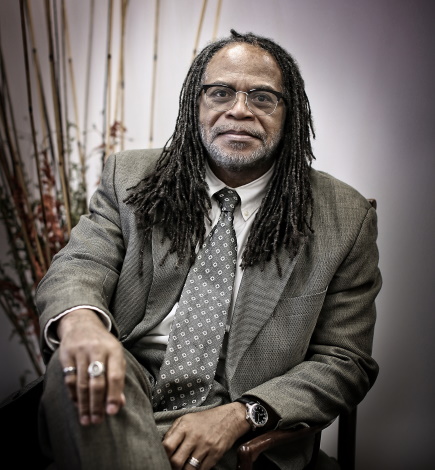After overcoming prison and drug addiction, School of Social Work alum now helps others using mindfulness and meditation
Upon his release from state prison in California, Eric Wilkins returned to his home state of Michigan for a fresh start.
 “While I find the policies of locking up addicts rather than providing treatment completely unproductive, I used each of my periods of incarceration for introspection and change in life priorities,” said Wilkins.
“While I find the policies of locking up addicts rather than providing treatment completely unproductive, I used each of my periods of incarceration for introspection and change in life priorities,” said Wilkins.
With a desire to help others struggling with addiction, he set his sights on earning an associate’s degree from Wayne County Community College.
“I wanted to become a peer mentor at a local substance abuse rehabilitation facility.”
One of his instructors reminded him that he would need a bachelor’s degree, if not a master’s, in social work if he wanted to really make an impact on clients. He decided to explore his options at the School of Social Work at Wayne State University, and met Shantalea Johns, who at the time served as an advisor guiding him through the transfer process.
“She was a wonderful support and resource during my entire time in both the Bachelor of Social Work and Master of Social Work programs.”
Wilkins uses his recovery experience and insight to serve the community
A social work clinical therapist at three local offices, Wilkins also practices Zen Buddhism, and is a board member and ordained teacher at the Still Point Zen Buddhist Temple in Detroit.
“My long-term recovery from substance abuse and living a balanced, fruitful life of service rests deeply within my spiritual practices.”
Wilkins presents mindfulness and meditation to his clients, but not in a forceful way. “For me, the term ‘mindfulness’ denotes that secular separation in which anyone open to trying it may feel invited, rather than coerced.”
Tina Louise, fellow social worker at Intersectional Insight in Huntington Woods, calls Wilkins “A treasured colleague and gifted therapist. He is truly an empathetic listener who beautifully incorporates mindfulness strategies with many other modalities in his work with clients."
Wilkins hopes to help his clients expand their capacity for self-understanding so they can be present in their lives, therefore more connected to others so they can reach their highest potential. And he, in turn, is always fully present for his clients.
Being fully present for our clients is the greatest element of any treatment a helping professional can offer. – Eric Wilkins, LMSW
CBHJ embracing ‘JEDI’ values
The Center for Behavioral Health and Justice (CBHJ), a center of excellence housed within the School of Social Work, is working to improve every intercept of the criminal justice continuum. The CBHJ is committed to ‘JEDI’ values - justice, equity, diversity, and inclusion.
“We want our work to be more reflective of these values and to give greater voice to those with lived experience. Our work with community partners across the state and with agencies like Nation Outside and Detroit Justice Center are some of the ways we help ensure that our work is aligned with and inclusive of the needs and perspectives of justice-involved individuals. Collaborating with and learning from the experience of Eric Wilkins is inspiring to the CBHJ, the School of Social Work, and to those who share similar experiences,” said Liz Tillander, CBHJ’s deputy director.
“I think it’s an amazing step forward in allowing those who have served their time to become productive members of the community, rather than stigmatizing them as pariahs,” said Wilkins.
‘We are not powerless. One person can make a difference.’
In addition to helping others through social work therapy, Wilkins also gives back to his alma mater. He and his wife have sponsored the Eric and Margrit Wilkins Annual Scholarship in Dance for the past few years.
“The scholarship supports undergrad dance students in the Maggie Allesee Department of Theatre and Dance. What a great way to impact students, we are very grateful for their support!” said April Hazamy, major gifts officer for the College of Fine, Performing and Communication Arts.
And despite personal setbacks and unrest in our world, Eric Wilkins remains hopeful for the future.
“I’ve seen my own life rise from the gutters and back alleys, but I’ve also seen the dedication to positive change by our young people as they cope with the challenges of modern living. How can we do better for ourselves and neighbors? Perhaps by understanding that we must take responsibility for our own lives, how we live them, and how they impact others. We are not powerless; one person can make a difference.”
Author: Laura Hipshire, laurahipshire@wayne.edu